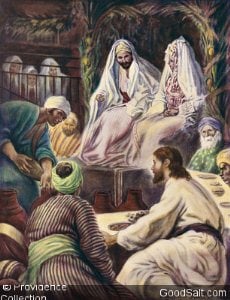Thursday: Jesus and Romance
 Read John 2:1–11. What does this tells us about Jesus’ attitude toward marriage and romantic love? What does it mean that He gave His blessing to such boisterous and long-drawn-out affairs as Jewish weddings were in that day and age? 1
Read John 2:1–11. What does this tells us about Jesus’ attitude toward marriage and romantic love? What does it mean that He gave His blessing to such boisterous and long-drawn-out affairs as Jewish weddings were in that day and age? 1
Jesus had just returned from the wilderness of temptation, where He Himself had drunk the cup of woe. But from there He came forth to give the human family the cup of blessing and to consecrate the warm relationships of human life. Jesus, who officiated at the first wedding in the Garden of Eden, now performs His first miracle. Where? At a wedding meal.
A Jewish wedding in biblical times was an impressive occasion. A marriage in the small village of Cana in Galilee might have been the event of the year. The partying went on for days. Rabbis and students would stop studying. Everyone brought presents and, in return, the hosting family was expected to keep guests well supplied with food, drink, and merrymaking.
The running out of drink was, then, more than a minor disappointment. It was a catastrophe. And the mother of Jesus comes to describe the emergency to Him. She suggests nothing, nor is she passive. She speaks to the servants of the household and urges, “Whatever He tells you, do it.”
Jesus then tells the servants to fill six water pots. Archaeologists say that at that time a storage jar could hold 15–25 gallons. At a minimum then, we are talking about at least ninety gallons. Some scholars suggest at least one hundred twenty gallons.
The next thing we hear is the steward’s exuberant exclamation to the bridegroom, congratulating him: “ ‘ Every man at the beginning sets out the good wine, and when the guests have well drunk, then the inferior. You have kept the good wine until now!’” (John 2:10, NKJV).
If there are four quarts to a gallon and each quart yields six glasses, the size generally used at wedding receptions, that is a minimum total of 2,160 glasses. This means, then, 2,160 servings of the finest drink for one little wedding party in a backwater village of Galilee. Jesus, at a wedding, pours out the best that anyone had ever seen.
In this miracle we can see God’s creative power, the same power that created our world. And, in Jesus’ earthly ministry it is first expressed in the context of a wedding.
Romantic love and marriage are, indeed, wonderful gifts from God. We must remember, too, that Jesus was never married, and thus He leaves an example that shows that not everyone has to get married. Single people can live full and productive and joyful lives as well as married people can.

There are two things I see in the miracle at Cana. First is the unmistakable stamp of approval of the festivities that took place there. Second is the last sentence of the text for the lesson, “This beginning of signs Jesus did in Cana of Galilee, and manifested His glory; and His disciples believed in Him” (John 2:11 NKJV). So this was a faith builder for His disciples.
Jesus didn’t approve of gluttony and riotous party making but He did approve of the innocent, joyous occasions such as this. As a people we need to understand that God never meant life to be boring and depressive, that is what the devil wants it to be. On the other hand, there are proper limits. We are not to do as the world does in promiscuous drunken revelry.
Perhaps Jesus was not a “wet blanket” when it came to parties and potlucks. That seems to disagree with what the Bible says others that attended those parties perceived about him. Jesus himself acknowledged what others were saying.
“The Son of Man came eating and drinking, and you say, ‘Here is a glutton and a drunkard, a friend of tax collectors and sinners.’” Luke 7:34, NIV
While this passage is no doubt an exaggeration, I think that Jesus was probably not an ascetic. These charges might make no sense, otherwise. I think he might have enjoyed a good meal and a party celebration as much as the next man. Perhaps our views of Jesus may be overly influenced by our Puritan denominational heritage.
I think that there are three things that God give to live by they are life, the ten commandments and marriage.
I do not understand the example that the writer refers to, about Jesus, Jesus did not come to have fun but he came as a plan of salvation, if anyone can explain to me the relevence of Jesus’s example.